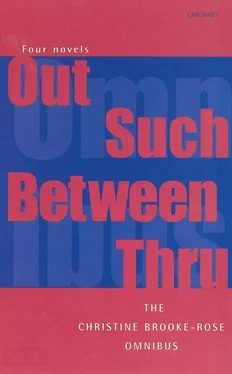The fly takes off. Perhaps the left canvas shoe has twitched slightly with the long waiting. The fly climbs up the air as if the air had steps, and at each stage it rests a little in a state of comatose suspension. From about eye-level it swoops to land on the left knee of the neighbouring human thigh whose leg has a foot that wears a blue canvas-shoe, well-worn but not, to the naked eye, in holes. The fly lands about fifteen centimetres away from the hand that holds an invisible bunch of flowers. Sooner or later a group of five names will be called out. It is a shock and a disappointment. It is with dismay that I have to report to you that your head gardener is still governed by reactionary prejudice. Ha! you dirty! Aaah, grrr.
— Please?
The neighbour’s face is as gnarled as his left hand. His eyes — the tiled floor is mottled. Up by the counter some twenty men stand in four short queues of five at each of the four grilled partitions. Further towards the door men mill about in murmuring groups of mostly Colourless faces, some detaching themselves to go out, some detaching themselves to come in. Above the door the notice says Do Not Spit. A Colourless boy pushes through the groups, looks around at the benches along the walls, hesitates then walks towards one of them along the opposite wall. The fly has left the mottled floor, frightened, perhaps, by the banging of metal cupboard doors and filing cabinets. The sound in the air, however, is mottled with human voices. It is all the more astonishing in view of the fact that your head gardener seems to be, to all appearances, himself an ex-Ukayan. The only possible explanation I can think of is all the more astonishing in view of the fact that the wall is dirty green and peeling. The portrait of the Governor on the far wall beyond the strong black heads of the employment clerks at their grilled partitions, the portrait of the Governor with his vain Asswati face, the fly sits like a wart on the corner of the Governor’s stalwart lips. The fly is reflected in the glass, like two warts. Unless perhaps it is a different fly, there being one fly inside the glass and one outside, the female fly seeking its mate on the mottled floor, the male fly on the Governor’s portrait, contemplating its image. The only possible explanation is that your head gardener is of a sanguinary complexion still uncontrollably radiating a reactionary prejudice.
Dear Mrs. Mgulu.
The neighbour’s gnarled hand that held an invisible bunch of flowers stretches out and lies flat on the left thigh. The far hand, which is also gnarled, and which may or may not have held an invisible bunch of flowers or even the stem of a glass, does the same. There is a tension in both the hands, as if the human mind in control of their movements expected at any moment to use them, perhaps for raising the body by means of pressure on the two knees. The thighs are thin and tightly trousered in faded denim. Creases starring out from the loin vanish under each wrist.
Dear Mrs. Mgulu. I hope you will not mind my writing to you, but through my wife I feel I am already acquainted with your great kindness and generosity and understanding. No doubt you know a little about me also. It is therefore in appeal to your well-known humanity-y-y-y
— You feel all right?
— Why?
— You groan much. It is long waiting.
— I’m in a state of comatose suspension.
— Please?
— I am happy with my thoughts.
— Excuse me.
The fingers drum a little on the thighs. The blue denim calls out the veins on the back of the hands. The chin crumples into a crumpled neck.
— Very witty. But unkind.
— He didn’t understand. He’s a foreigner.
— So are you.
— The dialogue will not take place, anyway.
— Sometimes it is sufficient just to be bloody rude.
— Sometimes it is sufficient merely to speak, to say perhaps or I don’t think so or how very interesting, as the case might be, for the effect to be bloody rude and the sequence, therefore, not to occur. Or to hammer a nail into the bent board over the dark sodden wood.
Dear Mrs. Mgulu.
The fly lies comatose on the Governor’s stalwart lips, unless it is contemplating its image. The Governor stares fiercely out regardless. The Governor gazes benignly down regardless. His dark eyes meet all eyes that meet his, but the meeting is not compulsory.
— Well I couldn’t help it, sir, I didn’t know. I wasn’t told.
— You people are all the same. You should have known and you could have found out. Listen you lot, this is the sort of thing I’m up against with you. This fellow says he’s a builder. He was sent to mend a roof-flashing which had got torn up by the gale and what did he do? He nailed it down into the wooden beam with ungalvanised iron nails. This in the rainy season. Needless to say they rusted immediately. The damp got into the beam and is rotting it.
The employment clerk hammers on the counter to make his voice louder and louder. The man on this side of the counter is puny, with a ginger head. Like a crooked ungalvanised nail he seems to sink into the tiled floor with every hammering of the employment clerk’s hand which is the colour of an old oak beam, startlingly braceleted with a white cuff-edge. The hall is silent. The silence of the hall is broken by coughs and shifting feet. The ginger head is raised again.
— I didn’t have no galvanised nails with me.
The bland Bahuko face shines, patched with curved oblongs and blobs of white light. The cuff-edge moves again, upholding the fly-flicking gesture of dismissal that must cause the ungalvanised nail to disappear from the floor.
There is a murmuring in the hall. The puny man with ginger hair shuffles past the row of sitting thighs and their belonging feet. His face is oxidised copper. Oxidative metabolism is a more efficient source of adenosine triphosphate than is fermentation. The greenish colour, however, is due to over-production in the gall-bladder, and gall-stones are the tomb-stones of bacteria. This is a good topic with which to go into reverse and bring about the sequence that has not yet occurred, should the non-occurrence of the sequence prove unbearable. Or not, as the case might be.
It is easy enough in the negative. It is more difficult to bring about than to prevent. Is this proposition true? Sometimes, anyway, the gruel is brought.
— Poor man.
— I beg your pardon? Smile to make up for tone.
— That man. He look sick.
— Oh, yes. He’s bilious. Over-production of the gall-bladder I should say.
— Please?
— I said, trouble in the gall-bladder.
— Were you doctor then in your country?
— Well, in a way.
— But why you queue here? They need doctors, many many sick, of the malady.
The fly, where is the fly? The Governor gazes benignly down regardless. Dear Mrs. Mgulu.
— Well. It’s a bit complicated. And you?
— Schoolmaster. Iranian. Useless here. Speak no good Asswati. Work on roads. Better for you, speak Ukayan, second language, and medicine better.
— Well. Not really.
— You ex-Ukayan?
— Yes.
— I see.
The sequence has occurred.
At home, a recipe would be read. At home there would be a remedy. It would occupy the air. Or a letter from someone possibly. According to our records you have not reported to this exchange for three weeks. Retrospectively a name will be called out daily from 8 a.m.
— You get slip?
— Er, yes.
— Doctors also?
— Well. Not quite. It’s a bit complicated.
— I understand.
— I wasn’t complaining.
— No. But sad. Excuse me. You take your dole pills?
— I haven’t reported for three weeks, just as it says.
— I have extra some. I collect but keep for big pep booze. You wish one?
Читать дальше












